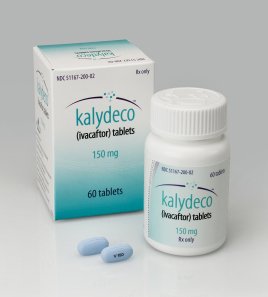FDA, Using Precision Medicine, Triples Number of Cystic Fibrosis Mutations Kalydeco May Treat
Written by |

The U.S. Food and Drug Administration (FDA) has expanded its approval of Kalydeco (ivacaftor) to include cystic fibrosis (CF) patients with one of 23 additional rare mutations — more than tripling the number of mutations the oral drug may be used to treat from 10 to 33.
But the decision’s significance reaches far beyond benefits for the affected patients, as it is also a win for precision medicine.
The FDA based its approval in part on data derived from Kalydeco’s test results in lab-grown cells with rare CF-causing mutations. The approach signals that future drug approvals can rely on data sources other than clinical trials, and opens up the inclusion of additional rare CF mutations.
“Many rare cystic fibrosis mutations have such small patient populations that clinical trial studies are not feasible,” Dr. Janet Woodcock, director of the FDA’s Center for Drug Evaluation and Research, said in a press release. “This challenge led us to using an alternative approach based on precision medicine, which made it possible to identify certain gene mutations that are likely to respond to Kalydeco.”
The drug’s manufacturer is Vertex Pharmaceuticals, based in Cambridge, Massachusetts. Vertex developed Kalydeco as part of a collaboration with Cystic Fibrosis Foundation Therapeutics, the nonprofit drug discovery and development affiliate of the Cystic Fibrosis Foundation.
The FDA estimates that more than 900 CF patients in the United States, aged two and older, carry the 33 mutations now included in the Kalydeco label — or another 3 percent of the CF population.
Earlier studies have indicated that a model using lab-grown cells with various mutations in the CFTR gene — the gene defective in CF patients — can be used to predict a patient’s response to Kalydeco. That model was used to examine the 23 included mutations. Data from the experiments allowed researchers to extrapolate information gathered in earlier clinical trials, involving other mutations.
 Kalydeco, a potentiator drug, acts on the defective CFTR protein — a chloride ion channel — by helping it stay open, allowing ions to pass. But since every gene mutation affects the protein in a specific way, Kalydeco is not likely to work in all CF patients.
Kalydeco, a potentiator drug, acts on the defective CFTR protein — a chloride ion channel — by helping it stay open, allowing ions to pass. But since every gene mutation affects the protein in a specific way, Kalydeco is not likely to work in all CF patients.
Expansion of the number of mutations shown to benefit from Kalydeco has been ongoing ever since the FDA approved the drug in 2012 for CF patients, 6 years or older, with the G551D mutation. Two years later, the FDA expanded the label by approving an additional eight mutations, followed by one more in late 2014. A full list of the approved mutations can be found in the updated Kalydeco prescription label.
“Five years ago, Kalydeco became the first medicine to treat the underlying cause of CF,” Dr. Jeffrey Chodakewitz, executive vice-president and chief medical officer at Vertex, said in a press release. “Since then, we have continued to invest in studies to improve the understanding of how this important medicine may benefit others with this serious and life-shortening disease.”
But the work is far from done. Vertex and the FDA are now discussing the potential approval of additional mutations. According to the company, these include one of five so-called splice mutations, which were included in the earlier Phase 3 EXPAND clinical trial (NCT02392234).
“We are encouraged by the FDA’s willingness to explore innovative ways to make highly effective medicines like Kalydeco with a well-established safety profile available to more people who are in urgent need,” said Chodakewitz. “We will continue to work closely with the FDA to bring Kalydeco to more people with responsive mutations who are still in need as rapidly as possible.”
The FDA has verified a test for analyzing the genes of CF-causing mutations for patients who don’t know which specific one is making them sick. It noted that “Kalydeco serves as an example of how successful patient-focused drug development can provide greater understanding about a disease.”
Vertex recently reported results from a Phase 3 trial (NCT02347657) in which Kalydeco, in combination with tezacaftor — a CFTR corrector it recently developed — was shown to benefit CF patients with one mutation that causes the CFTR protein to work poorly, and one F508del mutation.
The company plans to file marketing approval applications for the combination in both the United States and Europe later this year. Development of other Kalydeco combo treatments is also ongoing, as are plenty of ongoing studies on the full benefits of Kalydeco treatment.
“CF treatment has advanced rapidly, but there is need for broader access to these important medicines and development of additional medicines remains urgent,” said Dr. Patrick Flume, director of the Medical University of South Carolina’s Cystic Fibrosis Center. “The use of in vitro data to support this approval is an important step forward in making medicines like Kalydeco available to more patients, especially those with rare mutations.”






